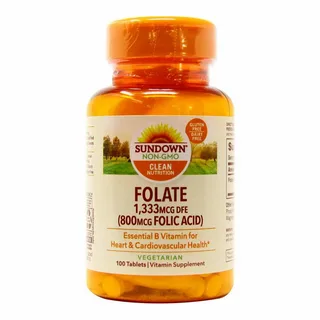Folate, also known as vitamin B9, is an essential nutrient that plays a crucial role in various bodily functions, including DNA synthesis, red blood cell formation, and cell division. Folate is especially important during pregnancy for fetal development and is commonly recommended to women of childbearing age to prevent neural tube defects in newborns. Folic acid is the synthetic form of folate found in dietary supplements and fortified foods. This comprehensive guide explores the numerous benefits of folate (folic acid) supplements, shedding light on their mechanisms of action and potential advantages for human health.
Understanding Folate (Folic Acid) Supplements
Folate is naturally found in foods such as leafy greens, legumes, citrus fruits, and fortified grains. However, many individuals may not consume enough folate through their diet alone, leading to deficiencies that can have significant health consequences. Folate supplements, often in the form of folic acid, provide a convenient and effective way to ensure adequate intake of this essential nutrient. Folic acid supplements are available in various forms, including tablets, capsules, and liquid formulations, and are commonly used to support overall health and well-being.
Promotes Fetal Development
One of the most well-known benefits of folic acid supplements is their role in promoting fetal development and reducing the risk of neural tube defects (NTDs) in newborns. Neural tube defects are serious birth defects that occur when the neural tube, which forms the brain and spinal cord, fails to close properly during early pregnancy. Adequate intake of folic acid before and during pregnancy has been shown to significantly reduce the risk of NTDs, such as spina bifida and anencephaly. As a result, folic acid supplementation is recommended for all women of childbearing age, ideally starting before conception and continuing throughout the first trimester of pregnancy.
Supports Red Blood Cell Formation
Folate plays a crucial role in the formation of red blood cells, which are responsible for transporting oxygen throughout the body. Folate is necessary for the production of hemoglobin, the protein in red blood cells that carries oxygen from the lungs to the tissues. Deficiencies in folate can lead to a type of anemia known as megaloblastic anemia, characterized by large, immature red blood cells that are unable to carry oxygen effectively. Folic acid supplements can help prevent and treat megaloblastic anemia by providing the necessary nutrients for red blood cell formation.
Reduces Risk of Cardiovascular Disease
Emerging research suggests that folic acid supplements may help reduce the risk of cardiovascular disease by lowering levels of homocysteine, an amino acid that has been associated with an increased risk of heart disease and stroke. Folate is necessary for the conversion of homocysteine into methionine, a process that helps regulate homocysteine levels in the body. Folic acid supplements have been shown to lower homocysteine levels, thereby reducing the risk of cardiovascular events such as heart attacks and strokes. However, more research is needed to fully understand the relationship between folate supplementation and cardiovascular health.
Supports Mental Health
Folate plays a critical role in brain function and mental health by contributing to the synthesis of neurotransmitters such as serotonin, dopamine, and norepinephrine. These neurotransmitters play a key role in regulating mood, behavior, and cognitive function. Deficiencies in folate have been linked to an increased risk of depression, anxiety, and other mental health disorders. Folic acid supplements may help support mental health and improve mood by providing the necessary nutrients for neurotransmitter synthesis. Additionally, some research suggests that folate supplementation may enhance the effectiveness of antidepressant medications in treating depression.
Supports Digestive Health
Folate is essential for maintaining a healthy digestive system and supporting gastrointestinal function. Folate plays a role in DNA synthesis and repair, which is important for the regeneration of gastrointestinal tissues and the maintenance of gut health. Additionally, folate is necessary for the metabolism of homocysteine, an amino acid that has been implicated in inflammatory bowel diseases such as Crohn’s disease and ulcerative colitis. Folic acid supplements may help support digestive health and reduce the risk of gastrointestinal disorders by providing the necessary nutrients for tissue repair and inflammation regulation.
May Reduce Risk of Cancer
Some studies suggest that folate supplementation may help reduce the risk of certain types of cancer, particularly colorectal cancer. Folate plays a role in DNA synthesis and repair, which is essential for maintaining the integrity of the genetic material and preventing the development of cancerous cells. Folic acid supplements may help reduce the risk of colorectal cancer by promoting healthy cell division and inhibiting the growth of cancerous cells. However, more research is needed to fully understand the relationship between folate supplementation and cancer risk, as well as the optimal dosage and duration of supplementation for cancer prevention.
Choosing the Right Folic Acid Supplement
When selecting a folic acid supplement, it’s essential to choose a high-quality product from a reputable manufacturer. Look for supplements that contain folic acid in its active form, as this is the most readily absorbed and utilized by the body. Additionally, consider the dosage of the supplement and choose one that provides the recommended daily intake of folate for your age and health status. As with any supplement, it’s essential to follow the recommended dosage and consult with a healthcare professional before starting any new supplement regimen, especially if you have underlying health conditions or are taking medication.
Conclusion
Folic acid supplements offer a wide range of potential health benefits, including promoting fetal development, supporting red blood cell formation, reducing the risk of cardiovascular disease, supporting mental health, promoting digestive health, reducing the risk of cancer, and supporting overall well-being. These supplements provide a convenient and effective way to ensure adequate intake of this essential nutrient, particularly for women of childbearing age and individuals at risk of deficiencies. Incorporating folic acid supplements into a balanced diet and healthy lifestyle may help optimize health and reduce the risk of various health conditions. With continued research and understanding, folic acid supplements may emerge as valuable tools for promoting health and well-being in individuals of all ages.
- Benefits of Folate (Folic Acid) Supplements - March 30, 2024
- Benefits of Devils Claw Supplements - March 30, 2024
- Benefits of Ginseng Supplements - March 22, 2024

